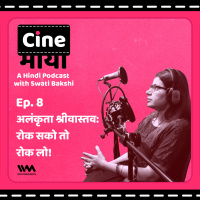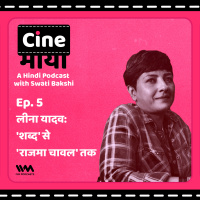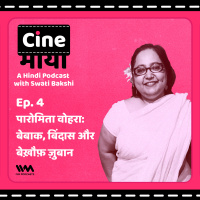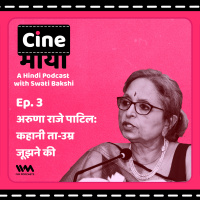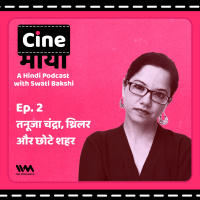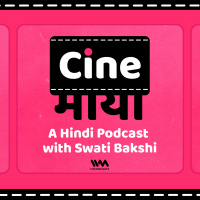Sinopsis
. ... , . ? .- , . 8 , . 10 .When we think about film directors in Indian cinema, do we ever think about women directors? The answer to this simple question underlines the complicated reality of film history and the invisibility of women directors. The debates and discussions around women and cinema usually tend to focus on the issues of representation and objectification but what about their authorial voice, their art and aesthetic? What about their creative drive, the decisions that they made and the obstacles that they faced as a director in the masculine world of the Indian film industry?Cine-Maya is a podcast that aims to decode the work and life of women directors, their vision and film language. This special series brings 8 Indian women directors in conversation with Swati Bakshi to discuss their cinematic journey. Episode out every Thursday, starting 10th January 2019.
Episodios
-
एपिसोड. 08: अलंकृता श्रीवास्तव: रोक सको तो रोक लो!
28/02/2019 Duración: 32minअलंकृता श्रीवास्तव हिंदी फ़िल्म निर्देशिकाओं की नई पीढ़ी की नुमाइंदगी करती हैं. उनका कहना है कि प्रकाश झा के साथ काम करके उन्होने ना सिर्फ़ फ़िल्म बनाने की कला सीखी है बल्कि अड़ कर खड़े रहने का हुनर भी हासिल किया है. उनकी फ़िल्म 'लिपस्टिक अंडर माए बुर्खा' की रिलीज़ को लेकर सेंसर बोर्ड से हुई तनातनी ने अलंकृता के इरादों को दबाया नहीं है बल्कि हवा दे दी है. सुनिए अलंकृता के अब तक के करियर की कहानी, उनका अनुभव और अगली फ़िल्म पर बातचीत. ‘Lipstick Under my Burkha’ director Alankrita Shrivastava had to fight a long battle with the Indian censor board. The film could finally release later on and Alankrita garnered a lot of support in India and overseas as well. Do these tensions impact a filmmaker’s practice? What sort of stories does she want to bring to the Indian audience? On this episode of Cine-Maya, Alankrita shares her deep seated ideas, influences and the time that she spent as Prakash Jha’s assistant. You can listen to this show and other awesome shows on the new and improved IVM Podcast App on Android: htt
-
एपिसोड. 07: शोनाली बोस: सुलगते सवालों से जूझने की ज़िद!
21/02/2019 Duración: 30min1984 में जब दिल्ली में सिख-विरोधी दंगे भड़के तब शोनाली बोस शहर में मौजूद थीं. उन्होने वो सारा मंज़र अपनी आंखों से देखा. बाद में दंगों पर आधारित एक नॉवेल लिखी जिस पर उनकी फ़िल्म 'अमू' बनी. शोनाली के लिए उनकी फ़िल्में सिर्फ़ एक आर्ट नहीं हैं बल्कि उनकी राजनीतिक सोच और सवाल उठाने का ज़रिया हैं. इस बातचीत में वो बता रही हैं उनकी फ़िल्मों के पीछे की कहानियां, सेंसर बोर्ड के साथ उनके अनुभव और लेखिका बनने की मजबूरी. Film director Shonali Bose's debut feature film 'Amu' which was based on 1984 anti-Sikh riots, earned her critical success and many awards. Her background in History and Political Science forms the basis of her critical film language and the overall politics of her cinema. Catch her in this conversation where she talks about her time in Delhi during the anti-Sikh riots, her female characters and the reasons for picking stories from her personal experiences. You can listen to this show and other awesome shows on the new and improved IVM Podcast App on Android: https://ivm.today/android or iOS: https://ivm
-
एपिसोड. 06: राजश्री ओझा: शहरी नज़र, ग्लोबल नज़रिया!
14/02/2019 Duración: 29minराजश्री ओझा ने अमेरिका में पढ़ाई करने के बाद मुंबई आने का फ़ैसला किया. दस साल के करियर में उनके नाम तीन फ़ीचर फ़िल्में हैं. एक फ़िल्मकार के करियर को नंबरों पर आंका जाए तो उनका पलड़ा भारी नहीं लगेगा लेकिन भारत के अलग अलग शहरों समेत न्यूयॉर्क में लंबा वक्त बिताने के बाद मुंबई में काम करना राजश्री के लिए कैसा तजुर्बा रहा? क्या उनकी समझ और पढ़ाई काम आई? सिने-माया की इस कड़ी में स्वाति बक्शी के साथ बातचीत में राजश्री अपने अनुभव पर लंबी बात कर रही हैं. After completing her education in America, film director Rajshree Ojha came to Mumbai to make films. Was that a right decision for her? Did she get enough opportunities to explore her ideas and vision to work in the commercial space of Hindi cinema? Catch this episode of Cine-Maya where Rajshree Ojha pours her heart out in conversation with Swati Bakshi. She also talks about the whole controversy that surrounded her directorial debut Aisha.See omnystudio.com/listener for privacy information.
-
एपिसोड. 05: लीना यादव: 'शब्द' से 'राजमा चावल' तक
07/02/2019 Duración: 36minसिने-माया की इस कड़ी में आप मिलेंगे वीडियो एडिटर से निर्देशन तक का सफ़र तय करने वाली लीना यादव से. अपनी शुरूआती फ़िल्मों में ही लीना यादव को ऐश्वर्या राय और अमिताभ बच्चन जैसे बड़े सितारों को निर्देशित करने का मौक़ा तो मिला लेकिन उनके करियर को वो ऊंचाई नहीं मिली जिसकी संभावना थी. लीना इसके लिए किसे ज़िम्मेदार ठहराती हैं और क्या उन्हें लगता है कि इंडस्ट्री औरतों के लिए मौक़े पैदा नहीं करती? In this installment of Cine-Maya, we meet Leena Yadav who has journeyed from editor to filmmaker. Even though she directed big names like Aishwarya Rai and Amitabh Bachchan in her first film, her career didn't rise to the heights as she thought. Who does Leena hold responsible for this and does she think the Film Industry doesn't create opportunities for women ? Lets find out. You can listen to this show and other awesome shows on the new and improved IVM Podcast App on Android: https://ivm.today/android or iOS: https://ivm.today/iosSee omnystudio.com/listener for privacy information.
-
एपिसोड 04. पारोमिता वोहरा: बेबाक, बिंदास और बेख़ौफ़ ज़ुबान
31/01/2019 Duración: 47minकुछ लोगों से मिलने के बाद ये समझ में आता है कि भले ही उनके काम की चर्चा सारा ज़माना ना कर रहा हो लेकिन उनका काम अपने आप में कितना अहम है और कितने लोगों को छू रहा है. पारोमिता वोहरा से मिलकर शायद आपको भी ऐसा ही लगेगा. बॉलीवुड कहे जाने वाले सिनेमा ने उन्हें मजबूर किया कि वो अपनी एक नई भाषा गढ़ें और उसी के साथ आगे बढ़ें. पारोमिता की डाक्यूमेंट्री फ़िल्में शोध का विषय हैं और बहुत हैरानी की बात होगी अगर आने वाले दिनों में उनकी फ़िल्मी भाषा और ऐस्थेटिक पर गहन अकादमिक चर्चा ना हो. It is difficult to define film director Paromita Vohra as she is constantly redefining herself. She is a director with a difference who believes in raising questions and provoking the desire to look for answers. She is a creative practitioner of sexual politics who is empowering people by devising tools to understand and express themselves as sexual beings. Paromita joins Swati Bakshi to talk about her documentaries, her directorial decisions and the politics of Bollywood. You can check out Paromita's innovative website- Agents of Ishq(htt
-
एपिसोड. 03: अरुणा राजे पाटिल: कहानी ता-उम्र जूझने की
24/01/2019 Duración: 44minसिने-माया की तीसरी कड़ी में अरुणा राजे पाटिल से हुई बातचीत सिर्फ़ एक निर्देशिका के फ़िल्मी करियर की कहानी नहीं है. ये कहानी है एक औरत के हौसले की, ठोकर खाकर फिर संभलने और ख़ुद को पा लेने की. अरुणा राजे ने अपने पति और निर्देशक विकास देसाई से तलाक़ के बाद ख़ुद को इतना अकेला पाया कि अपनी क़ाबिलियत पर भरोसा करने की हिम्मत भी जवाब देने लगी. लेकिन जिंदगी को कुछ और मंज़ूर था. उन्होने वापसी की अपनी फ़िल्म 'रिहाई' से और क़दम दर क़दम मानो दोबारा चलना सीखा. In episode 3 of Cine-Maya, you will hear one of the most dramatic human story of love, loss and hope. Film director Aruna Raje Patil is the first woman technician to graduate from the Film and Television Institute of India, Pune. She joins host Swati to discuss how people reacted when she started working in the industry and the sexual politics of the film industry that makes it difficult for women to survive and work.See omnystudio.com/listener for privacy information.
-
एपिसोड. 02: तनूजा चंद्रा, थ्रिलर और छोटे शहर
17/01/2019 Duración: 42minफ़िल्मकारों की नज़र और नज़रिए पर किन चीज़ों की छाप होती है? बचपन में बिताए पलों का उनकी कला से कितना गहरा रिश्ता हो सकता है, इसका अहसास तनूजा चंद्रा से हुई बातचीत से लगाया जा सकता है. सिने-माया की दूसरी कड़ी में तनूजा बताएंगी कि उत्तर भारत में बीते उनके शुरूआती सालों ने उन्हें क्या दिया है और वो एक निर्देशिका के तौर पर कैसा सिनेमा रचने में यक़ीन रखती हैं. Film director and writer Tanuja Chandra joins Swati Bakshi in episode 2 of Cine-Maya. Tanuja started her career with TV and her cinematic journey began with writing screenplays for films such as Dil Toh Pagal Hai, Tamanna etc. In this episode, she talks about her collaboration with Mahesh Bhatt, her mother and film writer Kamna Chandra and the kind of cinema she wishes to create.See omnystudio.com/listener for privacy information.
-
एपिसोड 01. नंदिता दास का सिनेमाई सफ़र
10/01/2019 Duración: 41minसिने-माया की पहली मेहमान हैं अभिनेत्री और निर्देशिका नंदिता दास जिनकी हालिया रिलीज़ फ़िल्म 'मंटो' ख़ासी चर्चा में रही. इस पॉडकास्ट पर हुई पूरी बातचीत, एक निर्देशिका के तौर पर उनके अनुभव को केंद्र में रखती है. नंदिता दास बताएंगी कि क्यों उन्होने 'फ़िराक़' के बाद फ़िल्म ना बनाने के बारे में सोचा और फ़ेमिनिस्ट कही जाने वाली कुछ फ़िल्मों से उन्हें क्या शिकायत है. In the inaugural episode of Cine-Maya, host Swati Bakshi is joined by Nandita Das to talk about her directorial journey. Nandita opens up about the difficulties that she faced during the making of her debut feature film Firaaq. She also discusses how gender plays a crucial role when women call the shots. Reach out to us on Twitter and Instagram @ivmpodcasts You can listen to this show and other awesome shows on the IVM Podcast App on Android: https://goo.gl/tGYdU1 or iOS: https://goo.gl/sZSTU5 You can check out our website at http://www.ivmpodcasts.com/See omnystudio.com/listener for privacy information.
-
एपिसोड. 00: क्या है सिने-माया ?
31/12/2018 Duración: 01minभारतीय सिनेमा के इतिहास को अगर भारतीय सिनेमा का पुरुष इतिहास कहा जाए तो कुछ ग़लत नहीं होगा. सिनेमा और ओरतें...ये ज़िक्र छेड़ा जाए तो आमतौर पर दिमाग़ में उभरते हैं पर्दे पर नज़र आने वाले चंद किरदार, कुछ चकाचौंध करने वाले चेहरे और ग्लैमर का बाज़ार. फ़िल्म निर्देशकों का ज़िक्र हो तो क्या आपको कोई महिला निर्देशिका एकदम से याद आती है? चलिए एक कोशिश करते हैं हमारे आस पास मौजूद होकर भी नज़र ना आने वाली इन महिला निर्देशिकाओं के सिनेमाई मायाजाल को समझने की. सिने माया सिर्फ़ एक पॉडकास्ट नहीं, एक पहल है. हम भारत की 8 महिला निर्देशकों की कला, नज़रिए और फ़िल्म इंडस्ट्री में उनके अनुभव पर चर्चा करेंगे. 10 जनवरी से सुनिए सिने माया स्वाति बक्शी के साथ. When we think about film directors in Indian cinema, do we ever think about women directors? The answer to this simple question underlines the complicated reality of film history and the invisibility of women directors. The debates and discussions around women and cinema usually tend to focus on the issues of representation and objectification but what about their authorial vo

